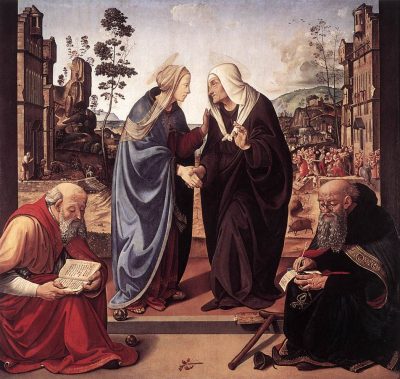 Readings:
Readings:
Micah 5:1–4
Psalm 80:2–3, 15–16, 18–19
Hebrews 10:5–10
Luke 1:39–45
On this last Sunday before Christmas, the Church’s Liturgy reveals the true identity of our Redeemer:
He is, as today’s First Reading says, the “ruler . . . whose origin is from . . . ancient times.” He will come from Bethlehem, where David was born of Jesse the Ephrathite and anointed king (see Ruth 4:11–17; 1 Samuel 16:1–13; 17:1; Matthew 2:6).
God promised that an heir of David would reign on his throne forever (see 2 Samuel 7:12–13; Psalm 89; Psalm 132:11–12).
Jesus is that heir, the One the prophets promised would restore the scattered tribes of Israel into a new kingdom (see Isaiah 9:5–6; Ezekiel 34:23–25, 30; 37:35). He is “the shepherd of Israel” sung of in today’s Psalm. From His throne in heaven, He has “come to save us.”
Today’s Epistle tells us that He is both the Son of David and the only “begotten” Son of God, come “in the flesh” (see also Psalm 2:7). He is also our “high priest,” from the mold of the mysterious Melchizedek, “priest of God Most High,” who blessed Abraham at the dawn of salvation history (see Psalm 110:4; Genesis 14:18–20).
All this is recognized by John when he leaps for joy in his mother’s womb. Elizabeth, too, is filled with joy and the Holy Spirit. She recognizes that in Mary “the mother of my Lord” has come to her. We hear in her words another echo of the Psalm quoted in today’s Epistle (see Psalm 2:7). Elizabeth blesses Mary for her faith that God’s Word would be fulfilled in her.
Mary marks the fulfillment not only of the angel’s promise to her, but of all God’s promises down through history. Mary is the one they await in today’s First Reading—“she who is to give birth.” She will give birth this week, at Christmas. And the fruit of her womb should bring us joy—she is the mother of our Lord.














